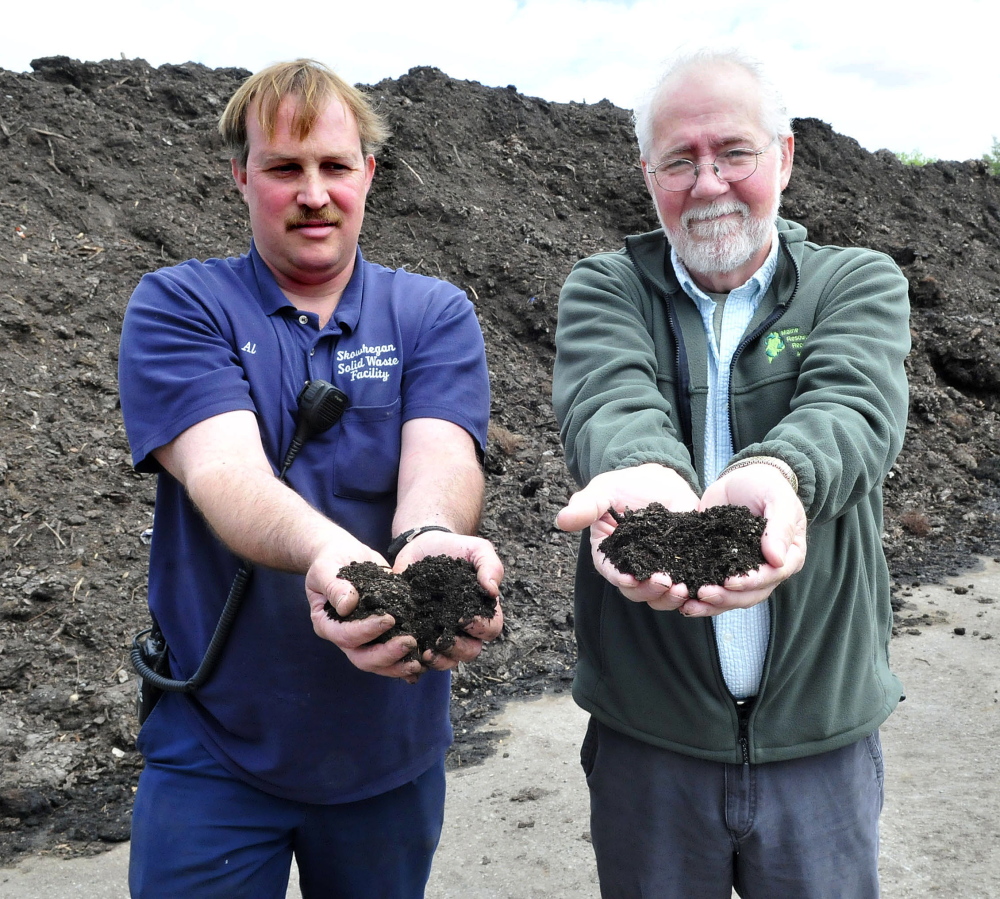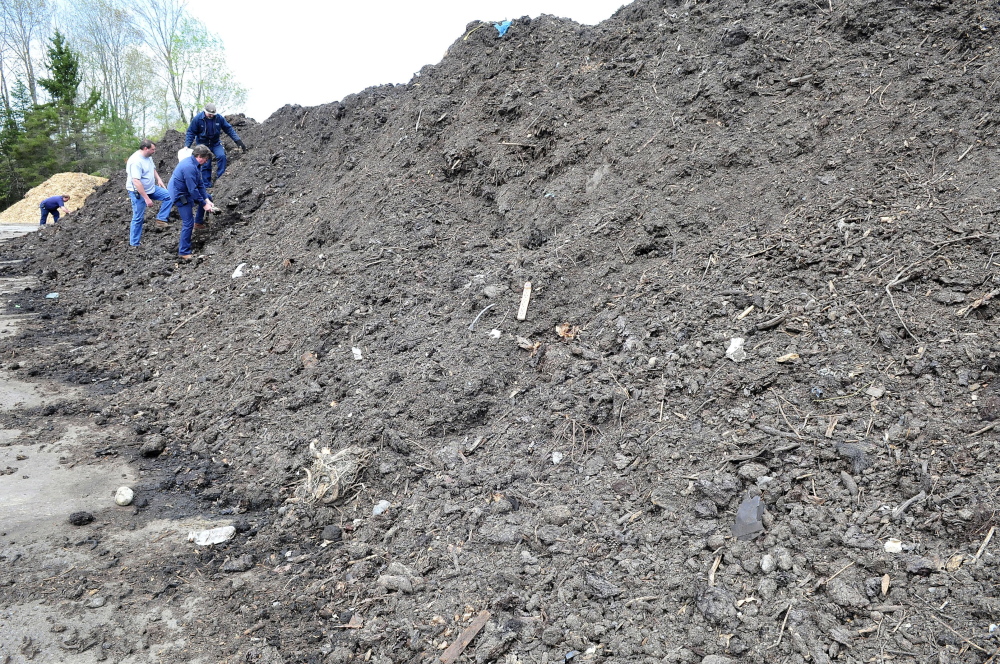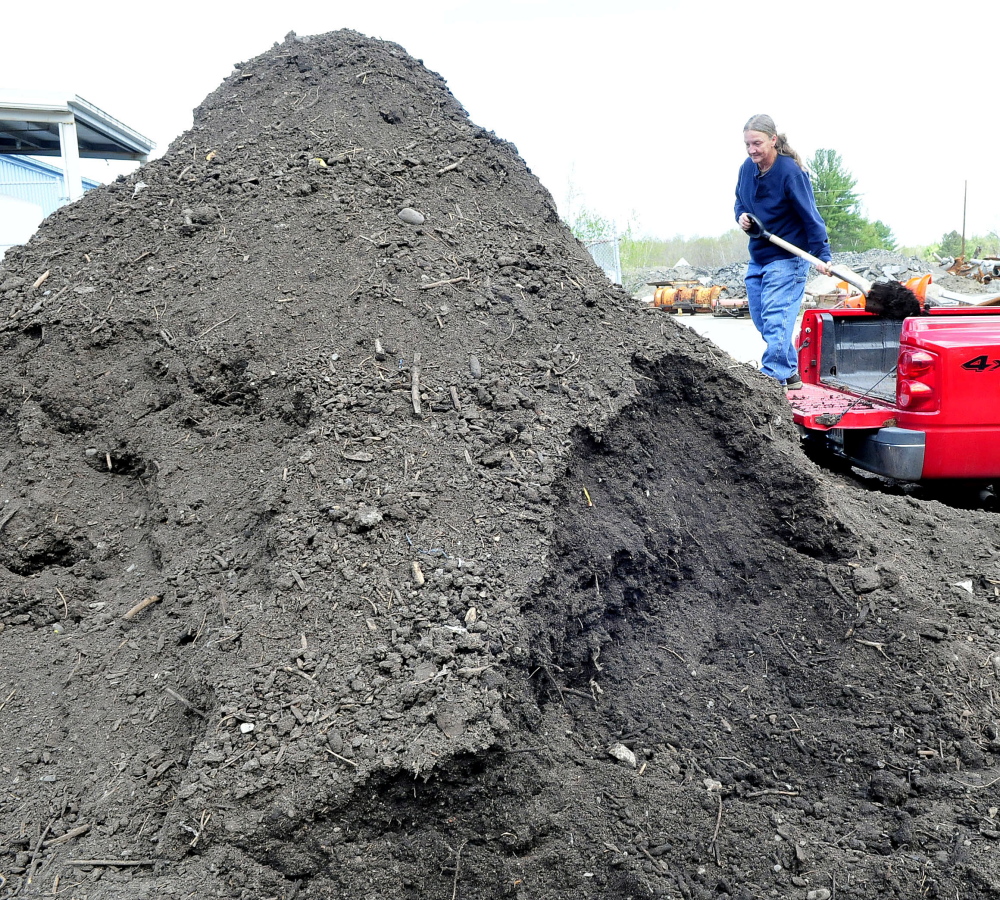SKOWHEGAN — Imagine a full-size wheelbarrow loaded with nutrient-rich, premium compost for a vegetable garden, lawn or flower bed.
Now multiply that half-yard wheelbarrow load by 1,800, and the result is the approximate volume of compost produced every year at the Skowhegan solid waste and recycling center — about 900 yards.
Most of it will be made available to town residents at no charge beginning June 1. Just take a shovel and a pickup truck and get to work, said Randy Gray, the town’s code enforcement officer and recycling facility director.
Gray said about 25 households now are adding to the compost pile of leaves, twigs and wood chips by providing all of their kitchen waste to help “cook” the pile into a quality product.
“This is our second year adding food scraps to our compost program. Food scraps exceed 30 percent of household trash, so we’re trying to get food scraps out of the waste stream and add them to our compost program,” Gray said Wednesday at the giant compost pile behind the recycling building. “The advantage is there is less money going to Waste Management, and at $66 a ton that’s big time money.”
Gray’s composting program and his team at the Solid Waste and Recycling Facility in April received an award for Compost Program of the Year from the Maine Resource Recovery Association. Gray’s operation previously won the award for Recycling Program of the Year in 2007.
Adding food scraps to the compost mixture makes an even better product and takes valuable nutrients out of the regular household trash, Gray said, adding that he is in negotiations with two local restaurants to take their discarded food to add to the pile. Gray said his program also accepts horse manure and chicken manure to spice up the mix.
Compost is organic material that can be added to soil to help plants grow, according to the U.S. Environmental Protection Agency. Making compost keeps organic material out of landfills, where it takes up space and releases methane, a potent greenhouse gas.
Composting requires three basic ingredients:
• brown material, such as dead leaves, branches, and twigs;
• green material, such as grass clippings, vegetable waste, fruit scraps and coffee grounds;
• rainwater, because having the right amount of water, greens, and browns is important for compost development.
A good compost pile should have an equal amount of brown and green material. It is also a good idea to alternate layers of organic materials of different-sized particles. The brown materials provide carbon for compost, the green materials provide nitrogen, and the water provides moisture to help break down the organic matter.
Gray, 61, said his team uses heavy equipment to mix leaves and summer waste collected by the highway department in the fall and mixes it all with sawdust from a local sawmill, manure, food waste and wood chips. He said the pile has an interior temperature of 150 to 170 degrees and “cooks” all winter long, making for a nice spring product of rich, soil-like compost.
Gray said his crew includes two certified composters, Steve Foss and Al White, who work the pile for maximum efficiency. The men take the pile’s temperature, turn the pile and “roll” it and mix the ingredients when it’s needed.
“The cooking process means it has to reach a certain temperature inside the pile. If it’s over temperature, it doesn’t work as good because so much bacteria doesn’t like too much heat,” White said. “If it’s under 150 degrees, the bacteria doesn’t like that because it’s too cold. So with the ideal temperature you’ve got thousands of bacteria cooking it. That’s what the heat is, the bacteria decomposing the other stuff.”
Gray said about 300 yards of the compost is mixed with loam and is used by the town highway department for summer roadside projects. The rest goes to town residents who want to use it as fertilizer.
“We went to a weeklong school that DEP offers at the Maine Compost School in Monmouth,” Al White said. “We spent a week down there and toured different places to see what other facilities do and how they compost in other places. We have to mix it up at a certain level so you have so much of the ingredients at each level. You can’t just throw all of one kind of stuff in there. You have to have all the other stuff in there to make it work.”
The pile is sent through a screening machine to separate rocks and stones, large pieces of wood and plastic and then is ready for the garden or lawn. The finished product, which will be piled at the town highway garage on Greenwood Avenue, has been cured to an ideal moisture content and doesn’t smell, Gray said.
“Basically, you’re making soil,” he said. “Nothing goes to waste. Every bit of this gets used. In fact, if we produced more, we could get rid of it all. It’s paid for with taxpayers’ dollars, and the taxpayers ought to be able to get it at no charge.”
Gray, who has worked for the town of Skowhegan for 35 years, said the town saves about $15,000 per year in trash disposal fees by diverting material away from the waste stream and into the compost pile, plus the taxpayers are getting money back by not having to pay $6 for a bag of commercial compost for garden fertilizer.
As for the recent award for his composting program, Gray said he can take some of the credit, but mostly it is a group effort by his team of five full-time staff people.
“I’m very proud,” he said. “Not so much for myself, but what I’ve seen happen over my 14 years here at the recycling facility. I took a program that wasn’t talked about, that wasn’t even recognized, into something that is recognized statewide. I’m damn proud of that, and I was only a little piece of it.”
Gray said residents can begin taking the finished compost June 1 using their personal vehicles and tools. No heavy equipment is allowed.
For more information about joining the composting program, contact Randy Gray or his administrative assistant, Cynthia Kirk, at 474-6904. There will be an open house at the recycling facility June 13 from 9 a.m. until noon.
Doug Harlow — 612-2367
Twitter: @Doug_Harlow
Copy the Story LinkSend questions/comments to the editors.






Success. Please wait for the page to reload. If the page does not reload within 5 seconds, please refresh the page.
Enter your email and password to access comments.
Hi, to comment on stories you must . This profile is in addition to your subscription and website login.
Already have a commenting profile? .
Invalid username/password.
Please check your email to confirm and complete your registration.
Only subscribers are eligible to post comments. Please subscribe or login first for digital access. Here’s why.
Use the form below to reset your password. When you've submitted your account email, we will send an email with a reset code.